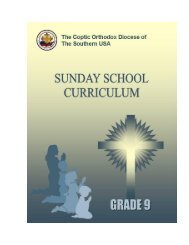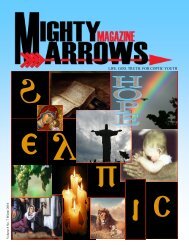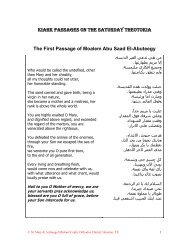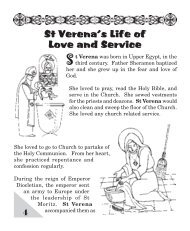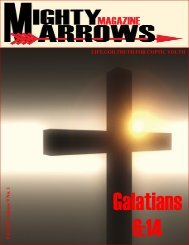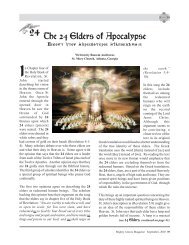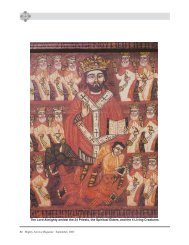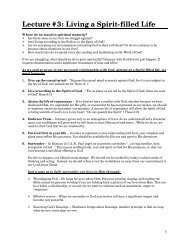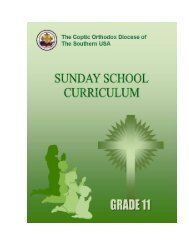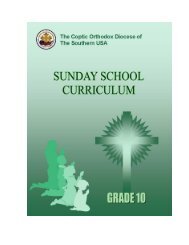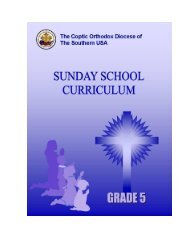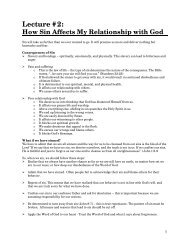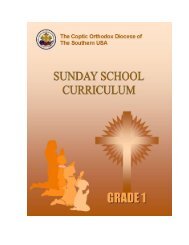Grade 12 - Coptic Orthodox Diocese of the Southern United States
Grade 12 - Coptic Orthodox Diocese of the Southern United States
Grade 12 - Coptic Orthodox Diocese of the Southern United States
Create successful ePaper yourself
Turn your PDF publications into a flip-book with our unique Google optimized e-Paper software.
Sunday School Curriculum <strong>Grade</strong> <strong>12</strong><br />
St. Paul was accused <strong>of</strong> not having <strong>the</strong> Corinthians‘ credentials.<br />
St. Paul was accused <strong>of</strong> being without depth in spiritual experience.<br />
In 2 Corinthians, St. Paul emphasized three <strong>the</strong>ological <strong>the</strong>mes. First, humans do not possess <strong>the</strong><br />
power <strong>of</strong> God to manipulate it according to <strong>the</strong>ir will. Second, super apostles are according to <strong>the</strong><br />
flesh (2 Corinthians 5:17). They view Christ out <strong>of</strong> <strong>the</strong> present evil age. Third, St. Paul knows that <strong>the</strong><br />
Christians at Corinth are a new creation, and that <strong>the</strong>y should only live <strong>the</strong>ir lives in Christ and <strong>of</strong><br />
Christ, and not <strong>of</strong> <strong>the</strong>mselves.<br />
IV. Galatians<br />
Many <strong>the</strong>ologians are having difficulty determining which Galatia St. Paul was addressing when<br />
he first wrote <strong>the</strong> Epistle to <strong>the</strong> Galatians. There is a Nor<strong>the</strong>rn Galatia (territorial) and a Sou<strong>the</strong>rn<br />
Galatia (province). St. Paul criticizes <strong>the</strong> Judaizers for using <strong>the</strong> Old Testament as a sort <strong>of</strong> ritual<br />
prescription so that by keeping <strong>the</strong> ritual prescription <strong>the</strong>y can come closer to God. Their good news<br />
was conditional. They considered <strong>the</strong>mselves to be <strong>the</strong> gatekeepers to <strong>the</strong> gate <strong>of</strong> righteousness, and<br />
<strong>the</strong> key to <strong>the</strong> gate was <strong>the</strong> observances <strong>of</strong> <strong>the</strong> law including circumcision. St. Paul talks about<br />
justification by faith. The keynote in Galatians is 5:1, freedom in Christ. Through Christ, we have<br />
been freed from <strong>the</strong> tyranny <strong>of</strong> <strong>the</strong> law. Galatians 3:28 talks about <strong>the</strong> unity in Christ: freedom from<br />
any social or racial barriers. St. Paul also talks about <strong>the</strong> flesh that sets itself against God, and <strong>the</strong><br />
Spirit that frees us through Jesus Christ.<br />
V. First and Second Thessalonians<br />
St. Paul wrote <strong>the</strong>se two epistles around AD 50 from Corinth. They were delivered to <strong>the</strong><br />
Thessalonians by Silas and Timothy. St. Paul went to Macedonia and preached in Thessalonica,<br />
which was <strong>the</strong> capital. Many God fearers were saved, while <strong>the</strong> proselytes were mad. St. Paul,<br />
Timothy and Silas had to flee to A<strong>the</strong>ns. From A<strong>the</strong>ns, St. Paul sent Timothy to <strong>the</strong> Church <strong>of</strong><br />
Thessalonica with <strong>the</strong> epistles.<br />
A. The problems that led to <strong>the</strong> writing <strong>of</strong> First Thessalonians<br />
Accusations against St. Paul.<br />
Conflicts concerning <strong>the</strong> Parousia (means being near or being by, and <strong>the</strong> word refers to <strong>the</strong><br />
second coming <strong>of</strong> Christ).<br />
a) What will happen to those who already died?<br />
b) When will Christ return?<br />
Second Thessalonians is not as elaborate and detailed as Thessalonians 1. St. Paul realized that<br />
some <strong>of</strong> <strong>the</strong> Thessalonians became idlers waiting for <strong>the</strong> Parousia (2 Thessalonians 3:11) so he had to<br />
tell <strong>the</strong>m in <strong>the</strong> Second Thessalonians that certain signs had to be revealed first before <strong>the</strong> coming <strong>of</strong><br />
Christ.<br />
VI. Ephesians<br />
Ephesians is referred to by many <strong>the</strong>ologians as a ―<strong>the</strong>ological tract,‖ ―wisdom discourse,‖ and<br />
―liturgical homily‖. Ephesians was a circular letter. St. Paul wrote this epistle to refute <strong>the</strong> dualistic<br />
and Gnostic types <strong>of</strong> thinking that <strong>the</strong> Church was suffering from at that time. For that reason, St.<br />
Paul emphasized certain <strong>the</strong>ologies in Ephesians such as:<br />
132 THE GREAT FAST



